Roorkee (The Hawk): The Department of Hydro and Renewable Energy at the Indian Institute of Technology (IIT) Roorkee, in collaboration with the Science and Engineering Research Board (SERB), Government of India, successfully organized a workshop titled "Estimation of Carbon Footprint and GHG Emission from Surface Waters Onsite Sanitation System and Water Treatment System".
The event, graced by esteemed speakers and experts in the field, aimed at shedding light on vital aspects of best practices in greenhouse gas (GHG) emission estimation and mitigation. Participants were privy to insightful discussions, technical sessions, and engaging interactions that emphasized the need for sustainable practices in water segments and onsite sanitation.
Prof. K.K. Pant, Director of IIT Roorkee, stressed the imperative of adopting clean and green solutions, stating, "The path to a sustainable future lies in our ability to innovate and adopt clean solutions for Water, sanitation and hygiene (WASH). Measuring carbon emissions and mitigating GHG emissions through advanced techniques are crucial steps towards achieving sustainable development goals (SDGs)."
The workshop witnessed extensive discussions on topics ranging from the Paris Agreement, GHG emissions, insights from the Intergovernmental Panel on Climate Change (IPCC), to various measurement techniques and tools for GHG emissions from waterbodies, wastewater treatment facilities and on-site sanitation. Experts from industry and monitoring sectors provided valuable insights into carbon crediting mechanisms and associated marketing aspects.
Prof. Arun Kumar, Chairman of the Workshop Advisory Committee, commented, "Our discussions today highlighted the importance of global collaborations and collective efforts in addressing climate change. The Paris Agreement and insights from IPCC serve as guiding frameworks, but it's our shared responsibility to translate these into actionable strategies."
Prof Sanjeev K. Prajapati, coordinator of the workshop and Prof Subodh Sharma spoke on different tools and techniques for measuring GHG emissions from water and waste management sectors.
The event also saw enthusiastic participation from government officials representing Central and State Pollution Control Boards, NEERI, Delhi Jal Board, NEEPCO, Haryana Pond Management Authority, Bihar State Infrastructure Corporation, and Uttarakhand Pey Jal Nigam. Contributions from experts and participants from institutions like NUIST, IIT Delhi, VERRA, Carollo Engineers, British Columbia, UPES, and Kathmandu University enriched the discourse.
The workshop provided attendees with a platform to explore methods and tools for GHG emissions estimation, monitoring, and modelling. Participants gained a comprehensive understanding of GHG sources and sinks and navigated the intricacies of the carbon credit market.
As the event concluded, a call to action resonated amongst all participants for continued research, innovation, and collective efforts to combat climate change and forge a more sustainable future.
IIT Roorkee stands as a beacon for sustainable advancements, consistently driving initiatives that address both current challenges and future needs. This workshop underscores the institute's commitment to fostering knowledge exchange, collaboration, and actionable solutions in environmental sustainability. As a leading institution in engineering and technology, IIT Roorkee leverages its expertise to shape the future of carbon management for climate resilience.

